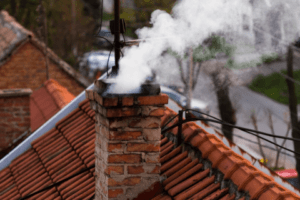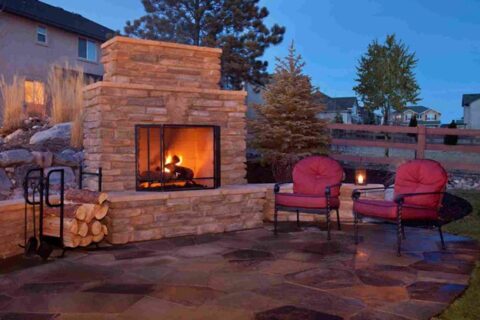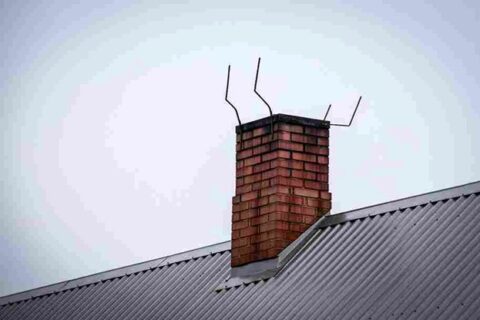How Your Chimney Works?
Masonry Chimneys in Glen Burnie, MD
Many homeowners in Glen Burnie, MD take their chimneys for granted. ChimneyTek wants to help our customers understand how chimneys work and the benefits they provide. Our chimney repair company will explain what types of chimneys you can choose from, answer the questions we frequently receive about how chimneys work, and explain the professional chimney services we offer throughout Anne Arundel, Baltimore, and Howard Counties. Contact our team today to learn more or schedule service.
How Does Your Chimney Work?
Marylanders enjoy their fireplaces for warmth and ambiance, but many don’t fully understand how a chimney works. Most of the time, you don’t need to know how your chimney works, but when smoke from your fire starts coming into your home, it’s essential to know what to do about it. Smoky fireplaces are a sign that something’s wrong and require your attention right away. Get in touch with our team for professional chimney repair and sweeping services at the first sign of a problem. A chimney that works correctly can keep your home safe and healthy. Allow us to tell you more about the types of chimneys your home might have.
What Types of Chimneys Are There?
There are three main types of chimneys: factory-built or prefabricated, masonry brick or stone, and freestanding stoves. The type of chimney you have in your home or business will depend on your geographic location as well as the kind of building you have. Learn more about these three common chimney types:
- Metal Chimneys – Also known as factory-build or prefabricated chimneys, metal chimneys are typically made of stainless steel. Metal chimneys can be double or triple walled. Prefabricated chimneys must be paired with prefab fireplaces. All parts of these systems are manufactured at a factory and assembled at the job site. Prefabricated metal chimneys have a flue pipe system that vents smoke out of your home. They are made from sheet metal which weighs less than masonry. Factory-built chimneys have been around for a century, and their popularity continues to grow.
- Masonry Chimneys – Most people picture a masonry chimney when they think of a chimney in general. Brick or stone masonry work is used for smokestacks that have been used for many centuries. They offer fine craftsmanship while keeping families warm. Masonry chimneys offer the most longevity and variety of styles. Masonry chimneys can be paired with fireplace inserts.
- Freestanding Stove Chimneys – A freestanding stove can be connected to a custom-made chimney. Your options include masonry construction or factory-built metal chimneys that have been designed, tested, and listed for use with a wood-burning appliance. Freestanding stove chimneys can use gas, wood, or pellets. Freestanding stoves may be connected to an existing fireplace chimney in some cases, creating what’s known as a hearth stove.
FAQ About How Chimneys Work
Over the years, we’ve received many questions about how chimneys work. Our team is happy to pass our knowledge onto you so you can become somewhat of a chimney expert. Check out the answers to these FAQ about how chimneys work:
What makes smoke go up the chimney?
There’s a lot of science behind how chimneys work. They’re designed to remove toxic byproducts from fires. Hot air rises because it’s lighter than cooler air. That causes the smoke to go up the chimney and escape from your home. Hotter fires result in stronger drafts, while smoldering fires may result in fumes going into your home due to the lack of a proper draft.
How does a chimney keep the rain out?
Chimneys are designed to keep most rain out of your home. Chimneys use a crown to protect them from the elements. Slanted crowns allow for water runoff when it rains or snows. The design prevents water from entering the chimney’s flue while preventing wear and tear on the masonry.
How long does a chimney last?
The answer to the question of how long a chimney will last depends on the type of chimney liner you have. A clay tile liner or cast-in-place chimney liner can last up to 50 years or more. Stainless steel flue chimney liners typically last for 15 to 20 years, but lower quality liners may only last five years.
What is a chimney damper?
Chimney dampers prevent conditioned air from escaping your home through the chimney flue when your fireplace is not in use. The damper must be opened when you start a fire. This allows the smoke to exit your home.
What do chimney flues do?
Chimney flues are ducts that allow smoke and waste gases to exit your home. This small part of a chimney is crucial for your health and safety.
Professional Chimney Services
ChimneyTek offers professional chimney services in Glen Burnie, MD. We service masonry chimneys in addition to any other type of chimney you might have. We provide the following services:
- Chimney masonry repair
- Chimney sweeping
- Chimney cleaning
- Chimney inspections
- Chimney relining
- Chimney leak repair
- Dryer vent cleaning
Schedule Chimney Services Today
As your local chimney sweep and repair experts, ChimneyTek would be happy to answer any other questions you might have about how your chimney works. We offer virtual chimney assessments in addition to all our previously mentioned chimney services. Contact us today for service in Anne Arundel, Howard, or Baltimore Counties.



